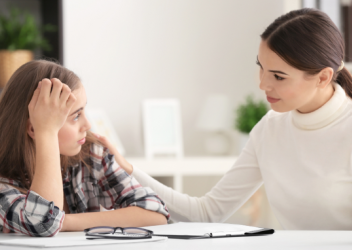Concussion and Mental Health
The Minds Matter Concussion Program takes a multidisciplinary approach to pediatric concussion care and research, including through our work to gain a better understanding of the connections between concussion and mental health. Approximately 1 in 3 young people diagnosed with concussion report symptoms of anxiety or depression – a clear indication of the significance of investigating connections between concussion, recovery, and the role of existing and new mental health concerns following injury.
As one of the few pediatric concussion programs in the country with dedicated mental health professionals, we aim to advance knowledge around the importance of understanding mental health diagnoses before and after injury and seek to develop therapies that reduce symptoms and improve health outcomes for children of all ages.
Minds Matter physician Mary Daley, MD, FAAP, CAQSM, and psychologist Jamie Shoop, PhD, discuss the psychological aspects of recovery after a sports injury.
Research Projects
- Assessing Changes in Quality of Life After Concussion More
This study assessed health-related quality of life (HRQOL) and the impacts on a young person’s physical, emotional, social and academic functioning after concussion. Using a standardized assessment tool, researchers found HRQOL was significantly lower in concussed youth soon after injury when compared to that of non-concussed control patients. Although most patients with concussion recover within four to six weeks, this study showed that concussion may continue to impact HRQOL for up to six months.
- Concussion and Pre-Existing Mental Health Diagnoses More
The study was the first to examine the dose-response effect of pre-existing mental health diagnoses on concussed youth. Minds Matter researchers found young people with pre-existing mental health diagnoses have more emotional symptoms following concussion and are greater risk to experience prolonged recovery. The study also highlighted that boys who experienced prolonged recovery after concussion had a greater emotional symptom burden than girls.
- Anxiety and Depression in the Acute Phase Following Concussion More
Researchers from the Minds Matter Concussion Program and University of Pennsylvania School of Nursing examined symptoms of anxiety and depression in pediatric patients ages 13 to 18 with without a concussion. Each patient completed standardized assessments of anxiety and depressive symptoms via the Patient-Reported Outcome Measurement Information System (PROMIS). Researchers found that around 1 in 3 youth had elevated symptom of anxiety or depression following concussion.
- The Role of Pediatric Psychology in Concussion Care More
As we continue to gain knowledge about the connections between concussion and mental health, Minds Matter seeks to describe the process and analyze the benefits of establishing pediatric psychology services for those who sustain a concussion.








